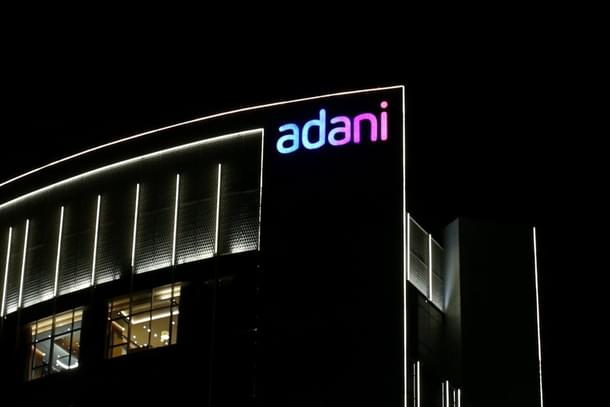Business
Adani Under Fire: The Perils Of India Inc's Global Ambition
Swarajya Staff
Nov 27, 2024, 01:24 PM | Updated 01:58 PM IST
Save & read from anywhere!
Bookmark stories for easy access on any device or the Swarajya app.


The recent indictment of Gautam Adani, Asia's second-richest man, by a United States (US) federal court has sent shockwaves through India’s corporate corridors.
The accusations have reignited debates about the growing scrutiny Indian businesses face as they ramp up their global ambitions.
For the Adani Group, it is a double whammy, as the fresh charges come less than two years after accusations of financial improprieties by short-seller Hindenburg Research, which wiped out $130 billion from the group's public market value.
Yet, Adani is not the only Indian tycoon feeling the heat. From corporate giants to fledgling entrepreneurs, Indian businesses across the globe increasingly find themselves under the microscope.
Just last month, nearly 400 entities, including 19 Indian firms and two Indian nationals, were sanctioned by the US Treasury Department for allegedly aiding Russia’s war effort and evading sanctions.
Most of these Indian entities are well-established companies in their respective domains. They are suppliers of electronic components, aircraft parts, and machine tools, among other things.
Even businesses abroad of Indian origin are not immune. In February 2024, Indian-Canadian entrepreneur Prem Watsa’s Fairfax Financial Holdings — listed on the Toronto Stock Exchange but with substantial investments in India — faced a short-seller attack from US hedge fund Muddy Waters, which sent Fairfax's shares tumbling by 12 per cent.
Crisis of Quality: The Curious Case of Food and Pharma
While the case against Adani Group centres around alleged corruption, India’s reputation as a global supplier of food and pharmaceuticals is also under attack.
In May this year, India's packaged spice manufacturers MDH and Everest came under regulatory scrutiny in several countries after their products were allegedly found to contain carcinogenic elements.
Following this, many countries, including Hong Kong, Singapore, New Zealand, the US, and Australia, initiated the most stringent crackdown, impacting all Indian spices.
This food safety scare came on the heels of a troubling pharma scandal over the quality of medicines manufactured in India.
Since 2022, the World Health Organization (WHO) has connected the deaths of at least 141 children in Gambia, Uzbekistan, and Cameroon to toxic cough syrups produced by Indian firms Maiden Pharmaceuticals, Marion Biotech, and Riemann Labs.
But while the pharma companies involved in the syrup controversy are small local players, MDH and Everest are household names with considerable financial clout, having generated $260 million and $360 million in revenue, respectively, in the fiscal year ending March 2023.
Thwarting China’s Reach
A key pattern emerges: all these cases involve Indian companies that have not only gone global but have also, by sheer merit, thwarted China's global outreach by winning contracts against Chinese bids.
Take Adani Ports and Special Economic Zone Limited (APSEZ), a key player in India’s global ambitions. The company is developing a terminal at Colombo port, directly competing with China’s existing operations there.
Similarly, Adani’s acquisition of Haifa Port in northern Israel for $1.03 billion in January 2022 marked a bold move to counterbalance China’s influence in the region where Shanghai International Port Group operates.
But with ambition comes resistance. The recent Securities and Exchanges Commission (SEC) bribery case against Adani raises questions about intent. Critics argue it’s more than just a legal matter — it could be a strategic effort to block Adani from raising funds in US markets and slow its aggressive expansion in ports, airports, and renewable energy.
The impact is evident: Adani Green, an energy company within Adani Group, was forced to cancel a reportedly $600 million sale of US-dollar-denominated bonds following the allegations.
The challenges aren’t limited to courtrooms.
The cancellation of a $2.6 billion airport-and-energy project in Kenya over corruption allegations is just one example of the coordinated resistance they face. The scope and precision of these attacks highlight not just the depth of their global influence but also the lengths detractors will go to undermine them.
Since the US indictment of Adani, a ripple effect has been triggered, with countries like Sri Lanka and Bangladesh now reviewing Adani-linked projects.
Preparing for the Storm
India’s private contribution to geopolitical infrastructure-building — from supplying electricity in Bangladesh to building and managing ports around the world — is a matter of pride.
However, the negative attention on Indian firms — whether warranted or strategically engineered — demands a proactive approach.
Hindol Sengupta, a professor of international relations, emphasises that both businesses and the Indian state must find "ways and means to predict, defend, and counter such attacks."
This is not to negate any real issues of bribery and corruption. These need to be tackled separately. But rarely do such cases get blown up for purely legal reasons, adds Sengupta.
India’s response must go beyond mere legal defences — it must embrace robust crisis management strategies. With the rise of short-seller attacks and regulatory interventions, having a plan is no longer optional.
"The best plan of action is to prevent U.S. regulators from getting involved. You need to have the right people to deploy if you are targeted. Your communication should be directed to immediate stakeholders like lenders, auditors, and business partners. Keep your responses tight and crisp, to no more than three pages. And act within seven to 10 days," says William J Stellmach, former head of the US Department of Justice's Fraud Section.
Similarly, in a country vying to become the pharmacy of the world by selling off-patent drugs worth billions of dollars to treat everything from the common cold to cancer, the cough syrup delinquency was not an isolated incident.
To preserve its leadership, India must undertake comprehensive reforms, aligning regulations with international standards, investing in cutting-edge facilities and technology, and prioritising the training of its workforce.
India’s companies are no strangers to challenges. But many of these hurdles are surmountable. A notable example is the alliance formed by six major pharmaceutical companies — Cadila Healthcare, Cipla, Dr Reddy’s, Lupin, Sun Pharma, and Torrent Pharmaceuticals. Together, they launched a collective initiative last year to tackle data integrity issues and champion a culture of quality. Such a move is a step in the right direction, but the work doesn’t stop there — much more must be done.
Adani’s legal battle is just the beginning of a new era of corporate scrutiny in this geopolitically charged era. But make no mistake — it won’t be the last. Preparing for what’s ahead is not just smart; it’s essential for sustaining India’s global momentum.





